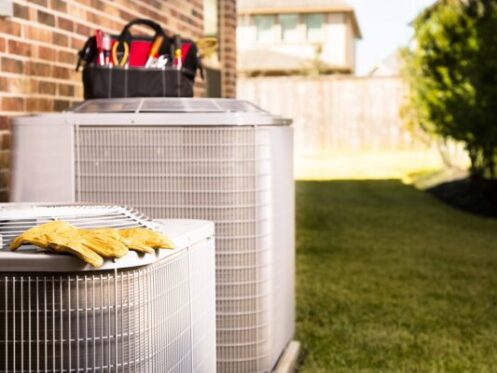Are you planning on turning on the air conditioner after winter passes? The cold months are finally on their way out, so spend some time preparing your cooling system for warmer weather to be ready for use when you and your family want it. Beat the rush once the temperature starts rising by making an appointment with us at Specialty Heating & Cooling LLC now for your cooling system tune-up in Tigard.
1. Check the Ductwork for Leaks or Damage
You should prepare your ductwork as much as possible. Addressing any leaks would be advisable before switching on your air conditioner. Due to flaws in the heating and cooling distribution system, a significant amount of energy is lost through the home’s ductwork. Examine any accessible ducting in basements, crawlspaces, and attics.
To concentrate your air sealing efforts, look for areas of damage or indications of air leaks. They are most frequently observed around exposed ductwork or by any separated couplings. Close air leaks where you can see them, and ask your HVAC contractor to help seal air leaks where you don’t have access.
2. Examine the Thermostat
Is your thermostat in good working order? If it’s time for a replacement, consider purchasing an energy-efficient programmable thermostat to keep your house at a comfortable temperature while saving money on utilities. Have a qualified HVAC technician also examine the thermostat’s position. It should be at least five feet above the floor and not close to any heat source, including direct sunlight.
3. Clean the Vents for Better Interior Air Quality
The steady air movement through your ducts and into your living spaces during winter leaves dirt, dust, and other material along your vents. When air moves through your home, dust and filth are swept up from the vents to float through the indoor atmosphere and land on surfaces.
Increasing the airborne contaminants in circulation and spreading them degrades indoor air quality, leading to health problems and increased allergy symptoms. You should periodically clean the vent covers and schedule a professional duct cleaning every three years.
4. Replace the AC Filter
To help your air conditioner start the season off well, check your filter and change it before turning on the AC. If you have pets indoors or the outdoor pollen count is exceptionally high, filters may need to be changed frequently. Check it once a month to see whether a filter replacement is required sooner than usual.
When the winter and early spring end, toxins from the home’s indoor air supply quickly clog your air filter. When the filter is full, it loses its ability to remove pollutants from the atmosphere. If you’re not routinely changing the filter, extra dust, dirt, and debris build up inside your cooling system, contributing to mechanical malfunctions and breakdowns.
5. Examine the Circuit Breaker
The circuit breaker for the air conditioner may have tripped during winter, or you may have turned off the circuit breaker for your outside AC unit last fall. You’ll have to turn it back on for the new season. It should be reset at least 24 hours before you turn on your air conditioning after the winter season. Contact a licensed electrician if there is a problem with the circuit board or if you need clarification on which breaker controls the outdoor unit.
6. Examine Any Visible Wires
It is critical to understand that your air conditioner is a piece of electrical equipment. If the flow of electricity is disrupted, your entire system may fail. As a result, you should check all visible wires for signs of wear.
If you discover anything unusual, contact Specialty Heating & Cooling LLC professionals for a system assessment. Avoid any exposed connections, and do not remove cover panels or screws. Simply inspect the visible wiring and look for anything out of the ordinary.
7. Inspect the AC Drain Line
Your HVAC equipment has a drain tube that permits moisture from air conditioning to drain away. If your drain line becomes clogged, it could harm your equipment or cause water damage elsewhere in your home. Check for dampness or water at the base of your unit. If you notice any and there is no other explanation, you should have your drain lines professionally checked and cleaned.
8. Inspect the Outdoor Condenser Unit
Before turning on the air conditioner after the winter, check for obstructions near the equipment and clean the area around the external condenser unit. Our technicians from Specialty Heating & Cooling LLC will thoroughly clean your air conditioner’s outside unit during a tune-up, but it’s still a good idea for you to give your outdoor unit a good cleaning. Remove any grass, leaves, or other material that might have accumulated on the condenser’s fins, as this can clog the interior components and reduce performance.
9. Check the Landscaping
Once the weather is warm enough to use an air conditioner, you can expect to see the flowers and grass start to grow. Dormant seeds are now springing to life. While it may look beautiful, it’s not healthy for your HVAC system. Maintain a two-foot perimeter of bare ground around the unit to allow unobstructed airflow.
10. Schedule Your Annual AC Tune-Up
Even after taking all of these precautions, it’s a good idea to have professional AC maintenance done by a certified local heating and air conditioning contractor. This once-yearly scheduled maintenance ensures your equipment’s correct operation.
Once the cold weather is through and you turn on the air conditioning, routine maintenance will find any minor problems and help you save money by lowering your energy costs this summer. You’ll stay cool throughout the summer if you keep up with the maintenance of your filter system, ducting, coils, and hoses. You’ll also avoid having to pay for costly repairs and replacements.
Turning on Your Air Conditioner
It’s time to switch on the air conditioning now that you’ve prepared your system. Fortunately, this step is easy. First, ensure that the circuit breaker for your system is on. Then, go to your thermostat and turn the equipment on there.
To allow dust to leave the system, starting the AC in fan mode is a good idea. Change from fan mode to cool after ten minutes. Check to see if the vents are blowing chilly air after the AC is switched on. Contact an HVAC expert from Specialty Heating & Cooling LLC if you cannot feel any cold air.
Get Your Air Conditioner Ready for the New Season
Trust our licensed residential and commercial heating and air conditioning specialists at Specialty Heating & Cooling LLC to put your system right for summer success. Our technicians provide the highest quality services to Tigard residents, and our committed experts work hard to exceed customers’ expectations.
If you live in Tigard, we can offer you a complete inspection of your HVAC system and a frank assessment of your best course of action for it. You can count on us for all your heating, cooling, and indoor air quality needs. We’ll also assist you with a water heater or generator. For advice or an AC inspection in the Tigard area, contact the team at Specialty Heating & Cooling LLC today.

